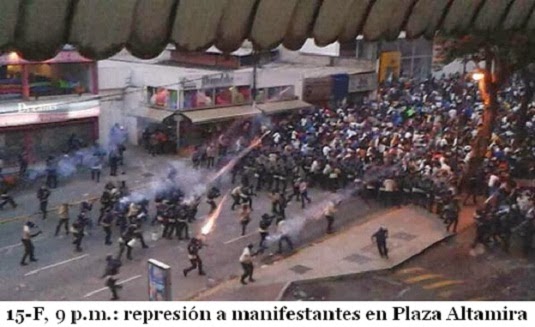Translation of Caracas, 15-F: Impressions from the street (Humberto Decarli, in El Libertario)
A lot of folks have been trying to follow what is going on in Venezuela; unfortunately, much of the discussion in U.S. radical Left and anti-war media has been heavily dependent on reports from government-controlled media, or limited to information from the English-language press; and commentary has been far too much dominated by simplistic binary narratives that present U.S.-supported politicos and the Bolivarian revolutionary
government as the only alternatives. Over the next few days, I hope to translate and post some of the news and commentary being put out by Venezuelan anarchists. This article is a short commentary by Humberto Decarli, published in the Venezuelan anarchist newspaper EL LIBERT@RIO. Inline links and editorial notes in footnotes are added by me. Because of the rapid development of events in Venezuela, you should be aware that I’m trying to produce these translations relatively quickly, and while I read Spanish fluently, what I’ve studied has usually been either Castilian or North American Spanish; so I’ve tried to consult friends who are native speakers from South America where I was unsure about what seemed to be idioms or local references peculiar to Venezuela. I apologize in advance for any mistakes or mangling of local idioms, which are of course solely my own responsibility. (If you notice any ambiguities or mistakes in the translation, please don’t hesitate to let me know in the comments, and I’ll attach a note or a correction to the text here.)
Caracas, 15-F: Impressions from the street
Humberto Decarli
I was in the Plaza Altamira today, February 15, until about seven[1] thirty p.m. I observed that, it being a Saturday at that hour there were many students, youths and motorizados, from about the Hotel Caracas Pálace up to a quarter south of the Torre Británica in Altamira Sur. There was an atmosphere of combatividad but without organization. No flyers, few banners, few papers and hardly any agitation. The few chants were: “Este gobierno va a caer,” sung (“This government is going to fall”); “No me da la gana, es una dictadura igualita a la cubana” (“I don’t want it, it’s a dictatorship exactly like the one in Cuba”); “El pueblo, unido, jamás será vencido” (“The people, united, will never be defeated”); “El pueblo, arrecho, reclama a sus derechos” (“The people, arising, are taking back their rights”) (these last have been around since my student days against the Acci?@c3;b3;n Democrática / COPEI governments.)
They are students without experience in politics or the struggle in the streets but all the same they have come out to challenge the bullets of the government’s “tontons macoutes-C.D.R.”[2] The National Guard is ready to intervene and every second they are making feints to frighten the people that runs but also comes back. What also sticks out, interestingly, is the non-existence of manipulation by the political parties or national leaders, which is highly satisfying. Neither, fortunately, are there electoral slogans, because there’s no election-carnival this year. There is initiatve because folks feel indignation at the scarcity, shortages, inflation, insecurity and frightening repression exercised by the “patriotas de los colectivos,”[3] a type of gang of thugs financed and armed by the government’s politico-military committee.
It pleases me to see the capacity for mobilization, but the question is, can it last? Are we in the presence of another Arab Spring? Is this the awakening of the Venezuelan people? It would be aprioritical to answer at this moment. What’s certain is the continuation of inflation, repression, scarcity, shortages, insecurity, etc. And the State’s got no answer because, being an import economy, it has no hard currency, because they arranged for dollars to come in bypassing the Central Bank; when the foreign currency that entered the country and was liquidated through CADIVI,[4] the government’s cronies carried off a third in their briefcases[5] — Giordani[6] dixit — without anyone, no matter how low on the totem pole, facing justice for it. To make matters worse, Iran has made an arrangement for its conflict with the West, to accept supervision of its nuclear program, and they are now dismantling the economic sanctions, and will go ahead with exporting 1.6 million barrels daily for the month of may, which will knock the market off its bench. Difficult moments for the militarist regime in Venezuela. All they have left is the exercise of force, appealing to what Foucault called the disciplinary power, or direct enforceability.
–Translation of Caracas, 15-F: Impresiones desde la calle by Humberto Decarli. Translated by Charles W. Johnson, with some extremely helpful assistance from Sergio Méndez.
- [1][
six: originally mis-written assix,
due to my careless error. Thanks to Joe in the comments below for the catch. –CJ 22.Feb.2014]↩ - [2]Tonton Macoute, an infamous force of paramilitary death squads formed by the Haitian dictator François ‘Papa Doc’ Duvalier, which murdered more than 60,000 Haitians from 1959-1986. CDR, Committees for the Defense of the Revolution, a Cuban network of Communist paramilitary/neighborhood snitch organizations initiated by Fidel Castro in 1960 to monitor and suppress “counter-revolutionary” activity.↩
- [3]Patriots of the collectives.↩
- [4]The Comisi?@c3;b3;n de Administraci?@c3;b3;n de Divisas, "Commission for the Administration of Currency Exchange"), the agency in charge of legal foreign currency exchanges in Venezuela.↩
- [5]Literally, “una tercera parte se las llevaron las empresas de maletín.” “Empresas de maletín,” lit. “briefcase enterprises,” are politically connected firms, which typically get government contracts by means of political preference or corruption. They are often “ghost” enterprises, which snag the government contract and then subcontract all the work to other companies.↩
- [6]Jorge Antonio Giordani Cordero (b. 1940), the current Minister of the People’s Power for Central Planning in Venezuela, responsible for most of Venezuela’s monetary policy during the current crisis.↩
